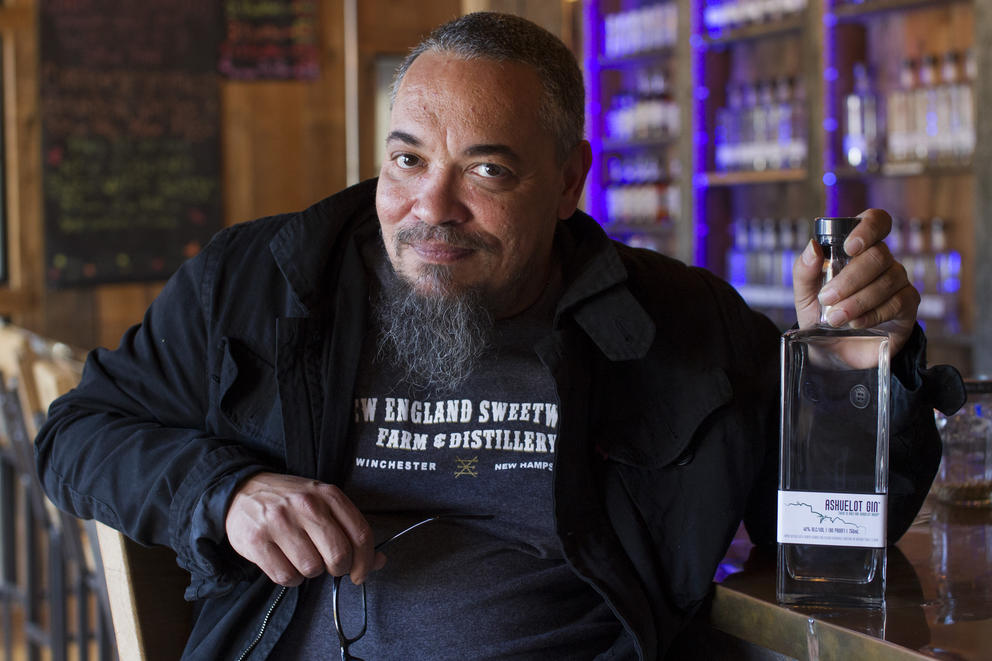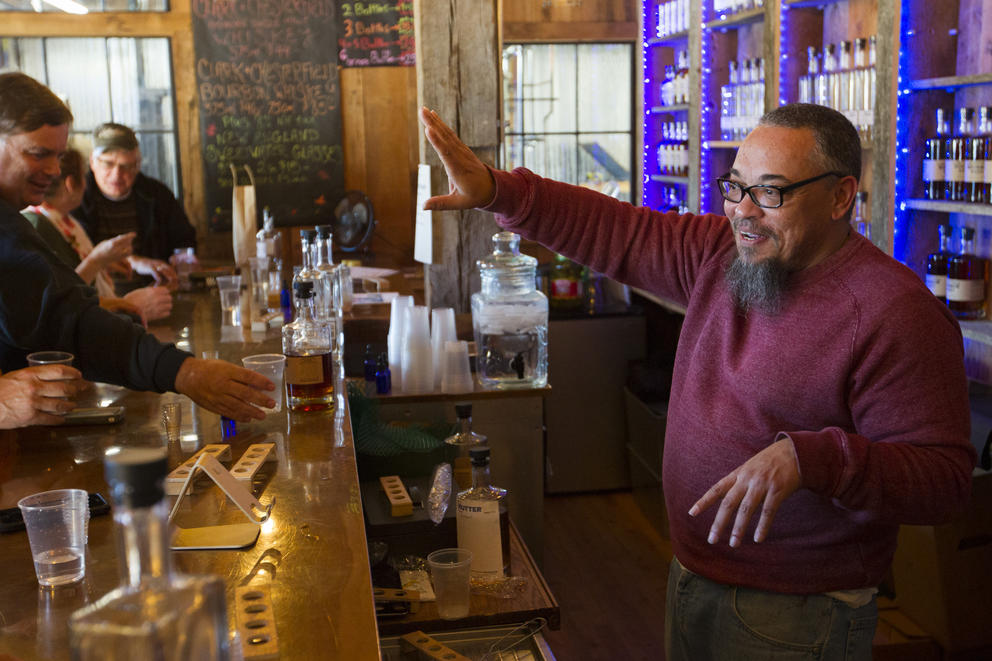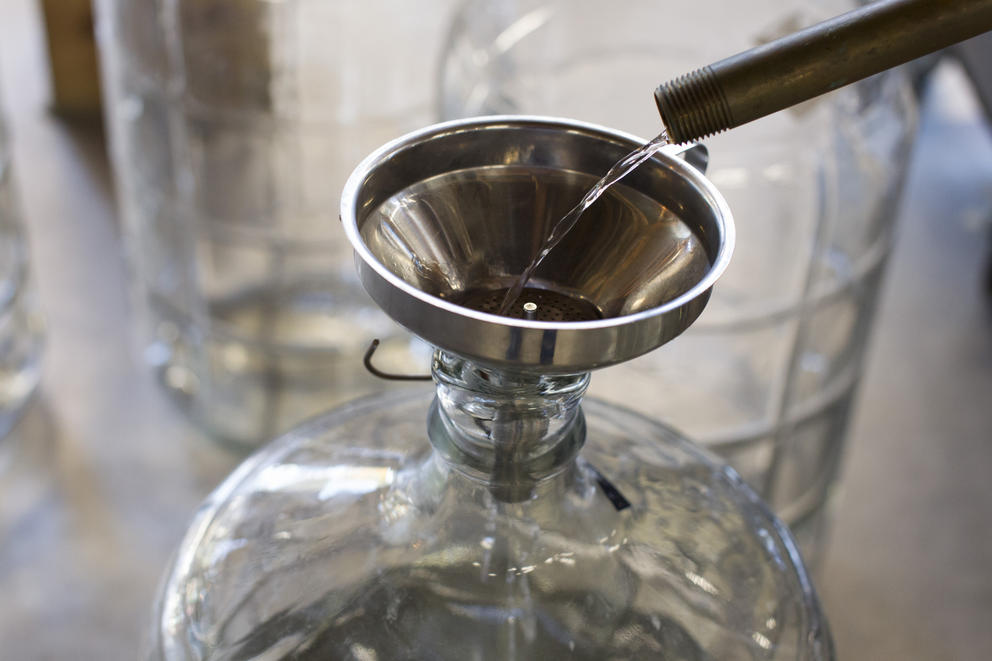


Robert Patton-Spruill is an alchemist. Rather than turning lead into gold, he turns apples, potatoes, and other homegrown ingredients into pure New England gin.
An independent filmmaker and director-in-residence at Emerson College, Patton-Spruill is no stranger to what he calls the “witchcraft magic’’ of transforming one thing into another. And now, in his spare time, he uses those skills to produce liquor at New England Sweetwater Farm and Distillery in Winchester, N.H.
“It’s the same way that film works. It’s like, ‘Oh we’re going to expose this film to light and we’re gonna capture an image.’ It’s that same kind of mystery and fun,’’ he says of gin making. “It’s science I can do that doesn’t require me to know the greatest amount of math, where I get to use my tongue.’’
Patton-Spruill says the distilling business started off as a “mid-life crisis’’ but quickly became a passion — not to mention one of the “funnest things’’ he’s ever done.
Now 47, he first learned to make basement moonshine as a child with his grandfather in Mount Airy, N.C. But by the time he turned 16, his grandfather had become a devout Christian and strict follower of televangelism, which put an end to the homemade booze.
“He threw everything out and was like, ‘I’m really sorry I taught you all that, boy. I hope you forget.’ But the reality is, once you’ve taught a man how to fish, a man knows how to fish.’’
So when he and his wife, Patti Moreno, in 2011 inherited the 50-acre family farm near Mt. Pisgah, just a few miles from Winchester, Patton-Spruill set about getting a license to distill vodka fuel and whiskey fuel for his farm equipment.
“Not much went into the tractor and the chainsaw to be honest,’’ he concedes.
By 2014, he had purchased and licensed an old hardware store in historic Winchester and began distilling spirits, making Patton-Spruill and Moreno two of the first licensed African-American distillers in the country, according to Chuck Cowdery, an industry expert and writer/editor for Whiskey Advocate magazine. (They also distill moonshine, whiskey, vodka, bourbon, and rum.)
While there are plenty of people who take pre-distilled spirits, alter them (called “rectifying’’) and label their liquors as “made in’’ or “bottled in’’ New England, the process of distilling gin is complicated, expensive, and rarely done. Most “locally made’’ gin is purchased as neutral grain alcohol from a distiller like Midwest Grain Products in Indiana and redistilled with flavoring onsite. The US Treasury Department controls labelling standards and allows companies to put “made in’’ on their bottles as long as they’ve altered the alcohol in some way.
New Hampshire law, however, requires that all alcohol claiming to be made in New Hampshire be distilled at every step from local raw ingredients. Patton-Spruill said that presents certain challenges.
“I think a distillery like Jack Daniel’s distills more booze in a day than I can make in a year,’’ he says. “It’s really hard. But at the same time, you’re looking at stuff that’s been the same for 60 years. Don’t people’s palates change? Don’t people want to taste something that has their land and air in it? And feel like it’s closer to home?’’
Splitting their time between the farm and their home in Roxbury, the couple has a whole system worked out. On weekends, Moreno treks into Boston to do tastings and market the spirits while her husband distills. During the week, they swap. Their daughter, meanwhile, is a student at Emerson.
“Even though distilling is so scientific, we both come from an artistic background and love how much creativity is involved,’’ says Moreno, an independent filmmaker and TV personality herself. “Concocting new flavors, coming up with cool names and recipes is so inspiring. It’s much more than being a chemist.’’
Patton-Spruill distills his gin from apples grown at Pine Hill Orchards in Colrain, Mass., and Russet potatoes from Hatfield. He grinds them all up and “cooks the living crap out of them’’ before fermenting them into a wine that is then distilled three times to purify it.
“It’s not fully pure, though, because I hate vodka or neutral spirits that don’t give you a hint of where they come from originally,’’ he says. “I think neutral spirits that smell like rubbing alcohol are nasty and should be used to clean hospitals.’’
Then, during the fourth distillation, he adds a “giant teabag’’ of botanicals including juniper grown on the farm.
And while their products can now be found in select stores in the Boston area including Blanchard’s in Jamaica Plain and Cambridge Wine and Spirits, Patton-Spruill admits that his gin may not be for everyone. He can’t compete with the big companies on price or availability but he holds fast to his local, lobster-roll-loving palate and insists that other New Englanders will lap it up as well.
“What really fuels me is every day trying to make the best booze I possibly can, that has the least amount of chemicals and stuff like that that can cause hangovers,’’ he says. “I just want it to be super clean and super nice, where you drink it and you say, ‘Hey that’s the taste of New England.’ And hopefully we’ll get there.’’
Carly Sitrin can be reached at carly.sitrin@globe.com. Follow her on Twitter @carlysitrin.



